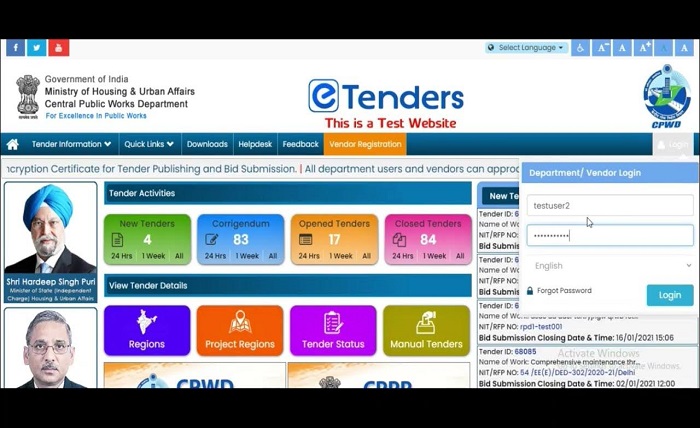CPWD eTender: A Comprehensive Guide

The Central Public Works Department (CPWD) is one of the largest construction agencies in India, responsible for the construction and maintenance of a wide range of public infrastructure projects, including buildings, roads, bridges, and water supply and sanitation systems. In recent years, CPWD has adopted eTendering as its preferred method of procurement, in order to improve transparency and efficiency.
What is CPWD eTender?
CPWD eTender is an online platform that allows CPWD to publish tender notices, receive bids from contractors, and evaluate and award contracts electronically. The system is designed to be user-friendly and transparent, and it provides a number of benefits to both CPWD and contractors, including:
- Increased transparency: The eTender system provides a single platform for all tendering activities, which makes it easier for contractors to track and participate in CPWD tenders. It also helps to reduce the risk of corruption and favoritism.
- Improved efficiency: The eTender system streamlines the tendering process, which reduces the time and cost involved for both CPWD and contractors.
- Reduced paperwork: The eTender system eliminates the need for contractors to submit physical bids, which saves time and money.
- Enhanced competition: The eTender system makes it easier for contractors from all over India to participate in CPWD tenders, which increases competition and leads to better value for money.
How to participate in CPWD eTender?
In order to participate in CPWD eTender, contractors must first register with the system. This can be done online at the CPWD eTender website. Once registered, contractors can view and download tender notices, and submit their bids electronically.
Important deadlines
CPWD tender notices typically specify a number of important deadlines, including:
- Bid submission deadline: This is the deadline by which contractors must submit their bids electronically.
- Tender opening date: This is the date on which CPWD will open the bids and begin the evaluation process.
- Contract award date: This is the date on which CPWD will award the contract to the successful bidder.
Evaluation criteria
CPWD will evaluate bids based on a number of criteria, including:
- Price: The price bid by the contractor.
- Technical qualifications: The contractor’s experience and expertise in the relevant field.
- Financial qualifications: The contractor’s financial stability.
- Past performance: The contractor’s track record of completing projects on time and to budget.
Award of contract
Once the bids have been evaluated, CPWD will award the contract to the bidder who has submitted the most advantageous bid. The successful bidder will then be required to enter into a contract with CPWD and begin work on the project.
Benefits of using CPWD eTender
There are a number of benefits to using CPWD eTender, both for CPWD and contractors:
- For CPWD:
- Increased transparency and accountability
- Improved efficiency and reduced costs
- Enhanced competition and better value for money
- For contractors:
- Easier access to tender information
- Reduced paperwork and costs
- A level playing field for all contractors
- A more transparent and efficient tendering process
CPWD eTender: A success story
Since its launch, CPWD eTender has been a resounding success. The system has helped to improve transparency and efficiency in the tendering process, and it has led to significant cost savings for both CPWD and contractors. In addition, the system has helped to increase competition and improve the quality of construction projects undertaken by CPWD.
Conclusion
CPWD eTender is a valuable tool for both CPWD and contractors. It provides a number of benefits, including increased transparency, improved efficiency, reduced costs, and enhanced competition. Contractors who are interested in participating in CPWD tenders are encouraged to register with the system and take advantage of its many benefits.




